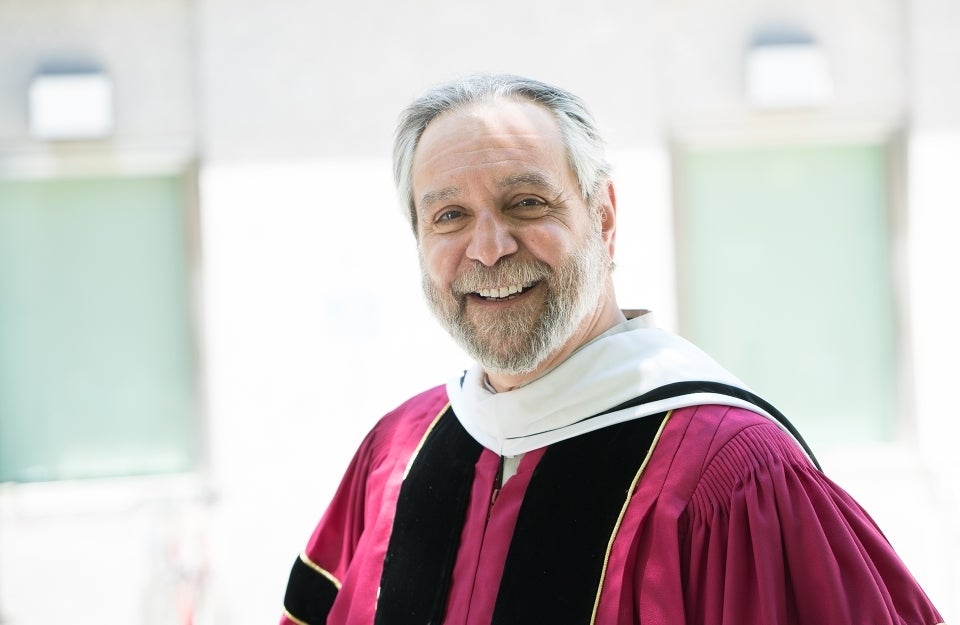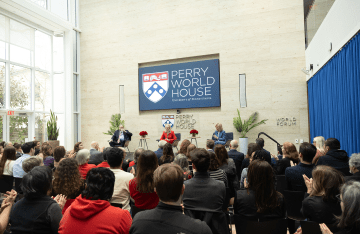Michael X. Delli Carpini Named Interim Dean of the Annenberg School
Delli Carpini was the school's fourth dean, serving from 2003 until 2018. He will serve until the search process for a new dean is completed.

Michael X. Delli Carpini, Ph.D.
Michael X. Delli Carpini has been named interim dean of the Annenberg School for Communication at the University of Pennsylvania, effective June 1, 2023. The announcement was made today by Penn President Liz Magill.
Delli Carpini, the Oscar H. Gandy Emeritus Professor of Communication and Democracy at the Annenberg School, served as the Walter H. Annenberg Dean of the Annenberg School from 2003 to 2018. He is currently concluding a term as the inaugural faculty director of Penn’s Stavros Niarchos Foundation (SNF) Paideia Program.
John L. Jackson Jr., the current Walter H. Annenberg Dean of the Annenberg School and Richard Perry University Professor, will begin his appointment as Penn’s 31st Provost on June 1. An international search to identify Jackson’s successor was launched in late February.
“As we continue to search for the next permanent dean of the Annenberg School, we are so fortunate that Michael Delli Carpini will take on this critical interim leadership post,” said President Magill. “Michael embodies what it means to be a good Penn citizen. Time and again, from his 15-year tenure as Annenberg dean to his inspired leadership of the SNF Paideia Program, Michael has answered the call of service.”
Delli Carpini’s interim appointment will be short term, with a potential start date for a permanent dean as early as fall 2023.
“I owe Penn a tremendous debt, from my time as a first-generation undergraduate student to over 20 years as a faculty member and dean,” said Delli Carpini. “Stepping in as interim dean is a small way for me to repay that debt, and I look forward to working again with the school’s great faculty, staff, and students.”
Delli Carpini’s leadership of the Annenberg School from 2003 to 2018 saw the hiring of world-class faculty members at the junior and senior ranks, building upon traditional areas of strength such as health communication, media institutions, and political communication, while blazing new trails in areas such as digital media, global communication studies, and technology and society. He presided over a major growth in Annenberg’s physical footprint, successfully steered the school through the 2007-08 economic downturn, and helped to make Annenberg an ever-more welcoming place for faculty, staff, and students of all backgrounds.
“Michael was a transformative dean,” said Provost-designate Jackson. “I am grateful, both personally and on behalf of Penn and Annenberg, to Michael for the stability and continuity that he will provide as interim dean. He could not be better prepared and positioned to lead with a steady hand during this transitional time.”
Delli Carpini’s research and teaching explores the role of the citizen in democratic politics, with particular emphasis on the impact of mass media and information and communications technologies on public opinion, public deliberation, political knowledge, and political participation. A decorated scholar, Delli Carpini received the 2008 Best Book Award from the American Association for Public Opinion Research for “What Americans Know About Politics and Why It Matters” (Yale University Press, 1996) and the 2008 Murray Edelman Distinguished Career Award from the Political Communication Division of the American Political Science Association. He was elected as a Fellow of the International Communication Association in 2018.
Prior to joining Annenberg as dean in July of 2003, Delli Carpini was Director of the Public Policy program of the Pew Charitable Trusts (1999-2003), and a member of the Political Science Department at Barnard College and graduate faculty of Columbia University (1987-2002), serving as chair of the Barnard department from 1995 to 1999. He began his academic career as an assistant professor in the Political Science Department at Rutgers University (1980-1987).
Delli Carpini is a Penn alumnus, having received his B.A. in political science and English literature and his M.A. in political science from the School of Arts & Sciences, both in 1975. He received his Ph.D. in political science from the University of Minnesota in 1980.



